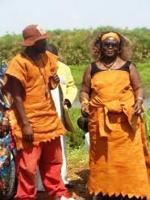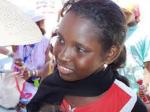Tugen people and their Culture in Kenya
Who are the Tugen People in Kenya? The Tugen are a branch of the Kalenjin community and they occupy the districts of Baringo and Koibatek in Rift Valley, Kenya.
Daniel arap Moi, the second president of Kenya (1978–2002) was from the Tugen branch. The Tugen people speak the Tugen language.
The Tugen are cattle keepers and the cow occupies a central part in their cultural lives, as food (meat and milk), currency, as dowry.
Among the Kalenjin community they are known as resilient since they live in harsh climatic conditions.
The Tugen are further subdivided into:
· Arror live in the Highlands of Kabartonjo and the lowlands of Kerio Valley (Barwessa) and lake Baringo of North Baringo District
· Samors who live in the wider Kabarnet in Central Baringo district
· Lembus who occupy the farmlands of Koibatek District
· Endorois who come from the lowlands of Koibatek District
Traditionally, like other Kalenjin, the Tugen prayed to a God called Asis (which means 'sun'.)
Most have converted to Christianity.Islam has flourished in the major towns and it was these towns that some Tugens convert into Islam and adopted Islamic names.
 The Land of the Tugen People in Kenya highland riftvalle
The Land of the Tugen People in Kenya highland riftvalleThe Tugen social organisation centres around the age-set, or ibindo. There are seven age-sets (ibinwek) which are rotational, meaning at the end of one ageset new members of that generation are born.
The order is roughly as given below. Among the some Kalenjin peoples, an age-set called Maina exists. However, among the Tugen, this ageset is extinct.
Legend has it that the members of this ibindo were wiped out by the Keiyo, their cousins in war. For fear of a recurrence, the community decided to retire the age-set.
Ibindo was given out at initiation and by simple arrangements, there ought to be one ibindo between a father and a son. For example, a korongoro cannot beget a kipkoimet.
 The Traditional House of the Tugen People
The Traditional House of the Tugen PeopleThe Tugen don't consider a woman to have an ageset, hence she can marry any ageset except that in which her father belongs. The Tugen say "ma tinyei ibin korko" which means a woman has no age set.
1. Chumo
2. Sawe
3. Korongoro
4. Kipkoimet
5. Kaplelach
6. Kipnyigei
7. Nyongi
Age sub-set (siritie)
In each age-set, the initiates were bundled into siritie or what can be understood as a 'team'. There are three 'teams' or siritoik in an age-set (ibindo) namely:
· Chongin
· kapchepsuei
· Barnot (literally youth)
· Notable people
· Daniel arap Moi,
· Hosea Kiplagat,
· Aaron Tuikong,
· Professor Joseph Tuitoek,
· Paul Tergat
More about Afican Culture
Kenya Culture |
Akamba |
British Colonialists |
Crafts |
Cultural Business Meetings |
Cultural Communication |
Cultural Eye Contact |
Cultural Gestures |
Gift Giving |
Cultural Law |
Cultural Music |
Cultural Space |
Cultural Time |
How to Talk in Kenya |
Recent Articles
-
Garam Masala Appetizers ,How to Make Garam Masala,Kenya Cuisines
Sep 21, 14 03:38 PM
Garam Masala Appetizers are originally Indian food but of recent, many Kenyans use it. Therefore, on this site, we will guide you on how to make it easily. -
The Details of the Baruuli-Banyara People and their Culture in Uganda
Sep 03, 14 12:32 AM
The Baruuli-Banyala are a people of Central Uganda who generally live near the Nile River-Lake Kyoga basin. -
Guide to Nubi People and their Culture in Kenya and Uganda
Sep 03, 14 12:24 AM
The Nubians consist of seven non-Arab Muslim tribes which originated in the Nubia region, an area between Aswan in southern









New! Comments
Have your say about what you just read! Leave me a comment in the box below.